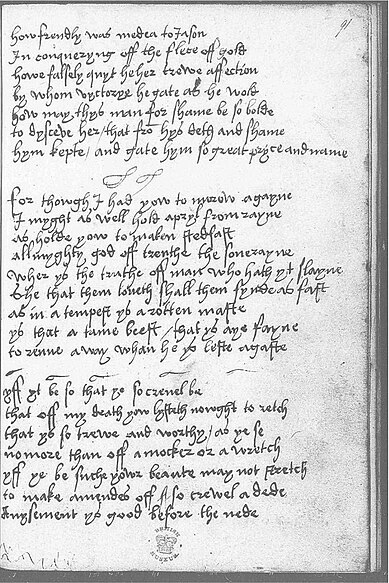The Devonshire Manuscript/yff yt be so that ye so creuel be
|
Introduction | Contributors | Textual Introduction |
| ←for thowgh I had yow to morow agayne | Wo worthe the fayre gemme vertulesse→ |
 |
f. [91r]
1 yff yt be so that ye so creuel be
2 that off my death yow lysteth nowght to retch
3 that ys so trewe and worthy / as ye se
4 no more than off a mocker or a wretch
5 yff ye be suche yowr beaute may not stretch
6 to make amendes off ss so crewel a dede
7 Auysement ys good before the nede
Commentary
editTranscribed by TH2, this entry is an excerpt from Chaucer's Troilus and Criseyde (Book II, lines 337-43) -- a long poem based on Petrarch's Rime 132. TH2 most likely copied from Thynne's edition of Chaucer (c. 1532). In this passage, Pandarus tries to convince Criseyde to love Troilus, but TH2 changes “his death” (Pandarus’s description of the effect on Troilus of Criseyde’s refusal) to “my death” in line 2. This passage is a continuation of the excerpt following it, "Wo worthe the fayre gemme vertulesse" (91v). Both passages may be considered as a single excerpt, but the preceding and following pages ("yff all the erthe were parchment scrybable" (90r) to Back Matter (93v)) contain seven-line passages separated by flourishes. The “woe- be-to” structure of “Wo worthe the fayre gemme vertulesse” gives the excerpt an individual character that can be clearly differentiated from the three-line organization of “Yff yt be so that ye so creuel.” Furthermore, the mark above the passage on "for loue ys yet the moste stormy lyfe" (91v) resembles a half flourish, which may indicate its separation from the preceding text. There is also an example of a continuous section on “For loue ys yet the moste stormy lyfe” (91v(1)) and “Also wyckyd tonges byn so prest” (91v(2)) spanning lines 778-791 of Troilus and Criseyde's Book II that has been divided into two separate seven-line passages by flourishes. Therefore, this seven line excerpt may constitute an independent entry.
The Devonshire Manuscript contains numerous other verses from Troilus and Criseyde (see: "And now my pen alas wyth wyche I wryte" (29v(1)), "O very lord / o loue / o god alas" (29v(2)), "O ye louers that hygh vpon the whele" (30r), "for thylke grownde that bearyth the wedes wycke" (59v), "Wo worthe the fayre gemme vertulesse" (91v(1)), "for loue ys yet the moste stormy lyfe" (91v(2)), "Also wyckyd tonges byn so prest" (91v(3)), "And who that sayth that for to love ys vyce" (92r), and "but now helpe god to quenche all thys sorow" (93r)). Other medieval and Chaucerian excerpts in the manuscript, possibly copied from Thynne's edition, include selections from Hoccleve ("Womans harte vnto no creweltye" (89v(1)) and "ys thys afayre / ys thys honor" (89v(2)), Richard Roos' La Belle Dame Sans Merci ("O marble herte and yet more harde perde" (90r(1)) and "Alas what shuld yt be to yow preiudyce" (90r(2)), the Chaucerian Remedy of Love first printed in Thynne's edition ("yff all the erthe were parchment scybable" (90r)), and Chaucer's Anelida and Arcite ("for thowgh I had yow to morow agayne" (91r)).
Textual Notes
editTexts Collated
editCollation
edit1 yff yt] If it T5068.11 creuel] cruel T5068.11
2 that] That T5068.11 off my death yow] of his dethe you T5068.11 nowght] nought T5068.11
3 that] That T5068.11 ys] is T5068.11 worthy /] worthy/ T5068.11 ye se] we see T5068.11
4 no] No T5068.11 off] of T5068.11 mocker] iaper T5068.11
5 yff] If T5068.11 suche yowr] suche/your T5068.11 not] nat T5068.11
6 to] To T5068.11 off] of T5068.11 crewel] cruel T5068.11
7 ys] is T5068.11